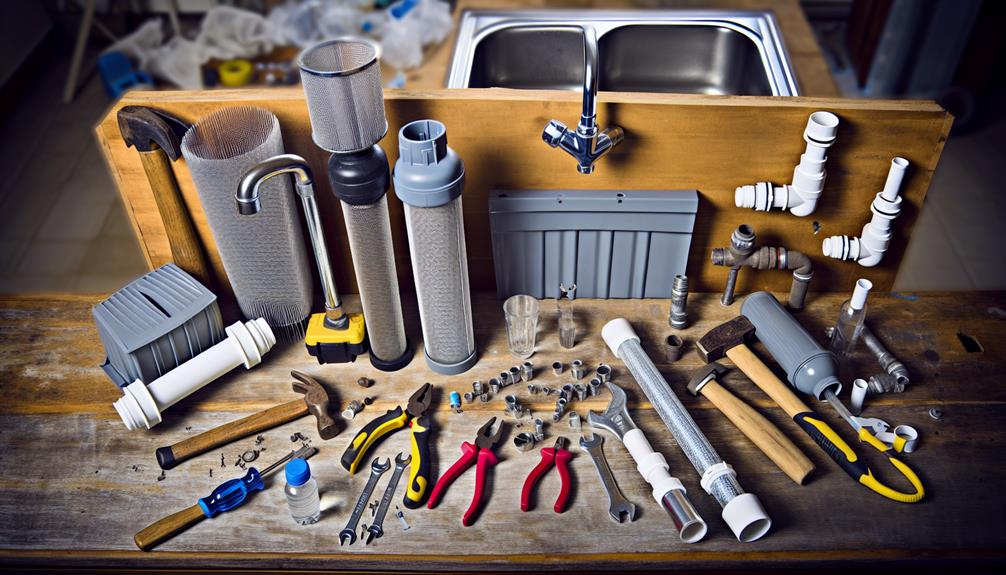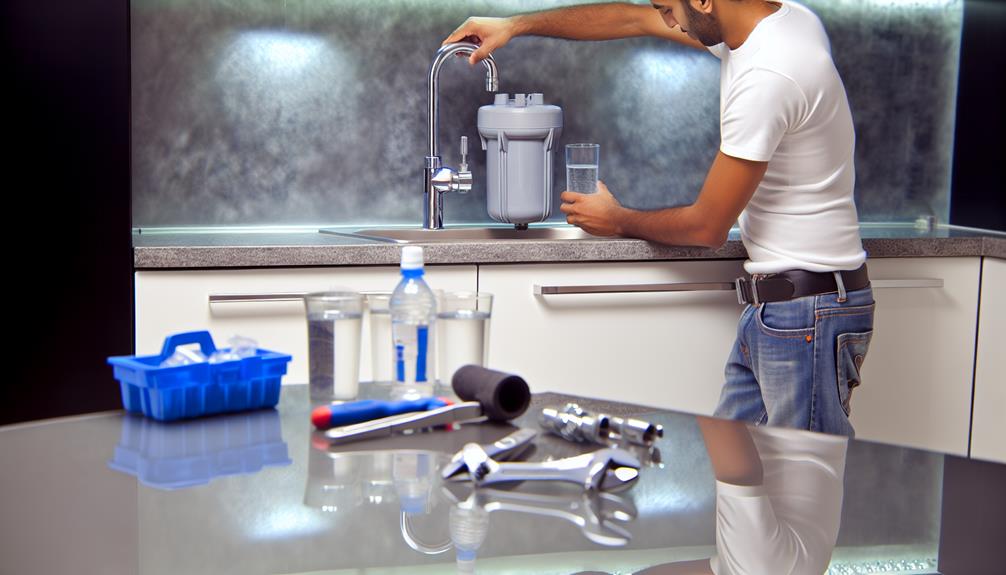Just as Benjamin Franklin famously noted that 'an ounce of prevention is worth a pound of cure,' so too does the adage apply to maintaining your home water filtration system. You're keenly aware that your health and budget both hinge on the quality of your water, and neglecting annual checkups can lead to costly repairs or replacements down the line.
By embracing a proactive stance, you can ensure your water remains pure without draining your wallet. The following tips aren't just about slashing costs—they're about investing in peace of mind and the longevity of your water filtration system.
But how exactly can you marry frugality with efficiency when it comes to filter maintenance? Stay tuned, as we're about to explore some effective strategies that will keep your system in top shape without breaking the bank.
Schedule Regular Maintenance
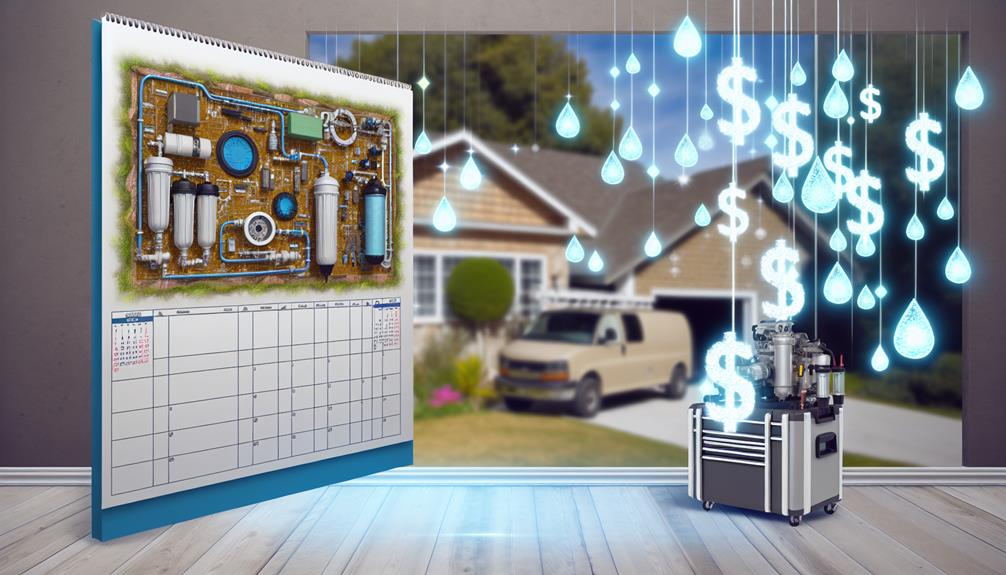
To ensure your water filter functions optimally, it's essential to establish a routine maintenance schedule. Preventive measures play a crucial role in this process, as they help you avoid potential malfunctions and ensure the longevity of your system.
Start by identifying the type of filter you have and the manufacturer's recommended service intervals. This will typically involve checking and replacing filter cartridges, inspecting for leaks, and verifying the integrity of seals and connections.
Incorporate filter upgrades into your maintenance routine to enhance your system's efficiency. Look for advancements in filtration technology that are compatible with your model. A higher-grade filter element can improve water quality and reduce the frequency of replacements needed.
You'll also want to keep a log of all maintenance activities, including dates and any parts replaced. This record is invaluable for troubleshooting issues and will help you recognize patterns that might suggest a deeper problem.
Lastly, don't overlook the importance of cleaning and sanitizing the filter housing. This step prevents microbial growth and the accumulation of sediment, ensuring that the water you consume is as clean and safe as possible.
DIY Inspection Techniques
You can perform a simple visual check to assess the condition of your water filter, looking for signs of wear, discoloration, or debris buildup. This initial step is crucial for maintaining the filter's effectiveness and extending its lifespan.
Begin by examining the housing for cracks or leaks, which can compromise filter integrity. If your filter has a transparent housing, check for any unusual changes in color or clarity of the water, which could indicate the presence of contaminants.
Next, carefully remove the filter cartridge, following the manufacturer's instructions to avoid damaging the unit. Inspect the cartridge surface for sediment or particulate matter that may have accumulated over time. Such buildup can reduce water flow and efficiency, signaling that it's time for a replacement.
Contaminant identification is key to determining if your filter is performing as expected. If you notice an increase in foreign particles or a change in taste or odor, it's likely that the filter is no longer effectively removing impurities. Always refer to your filter's specifications for the recommended replacement intervals. However, if you detect any abnormalities ahead of schedule, don't hesitate to replace the cartridge to ensure optimal water quality.
Optimize Replacement Cycles
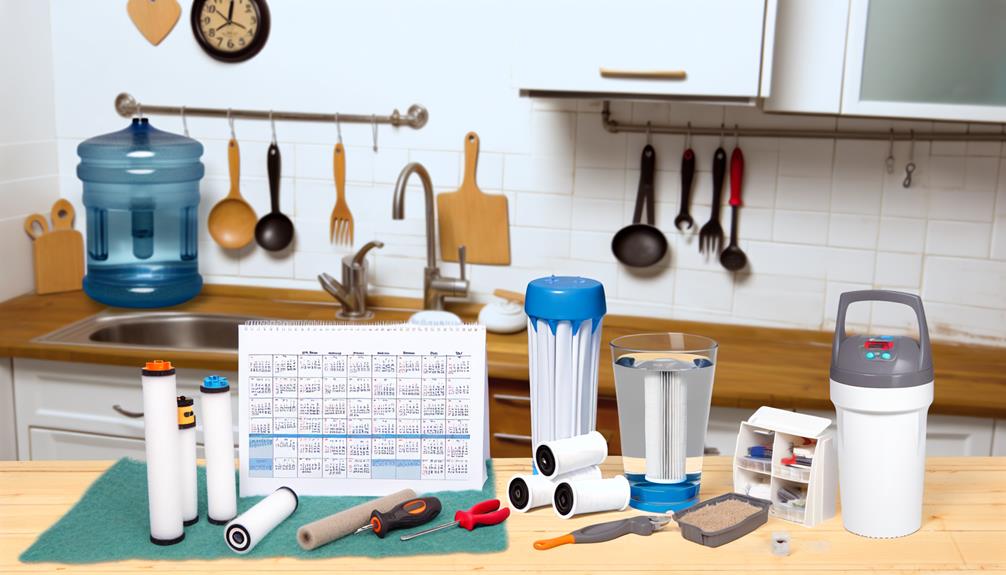
Maximizing the efficiency and longevity of your water filter hinges on establishing a tailored replacement schedule based on usage and water quality. Don't rely solely on manufacturer recommendations for filter lifespan, as these are based on average conditions. Your specific usage and the particular contaminants in your water supply may necessitate a more frequent or less frequent replacement cycle.
Begin by tracking your water consumption. Higher usage typically shortens filter lifespan. Note usage indicators such as a decrease in water flow or changes in taste or odor; these can signal that your filter is clogged or at the end of its useful life.
Next, analyze your water quality. If you're filtering highly contaminated or hard water, you'll likely need to replace your filter more often. Conversely, if your water is relatively clean, you might be able to extend the filter's lifespan beyond the standard period.
To optimize replacement cycles, consider investing in a water filter with a usage meter or a smart monitoring system. These tools provide real-time data on filter performance and alert you when it's time for a change. Keeping detailed records of filter changes and water tests will also help you refine your schedule over time.
Choose Quality Filters
Why settle for subpar performance when selecting a water filter, given that the quality of the filter directly influences both the purity of your water and the longevity of the filtration system? It's essential to invest in quality filters to ensure that your water is free from various contaminant types, such as chemicals, heavy metals, and biological entities. The higher the quality, the more effective the filter will be at trapping these unwanted substances.
When you're choosing a filter, look for one with a long filter lifespan. This not only means fewer replacements and less hassle for you but also indicates that the filter is robust and efficient at its job. A filter that lasts longer before needing a replacement is typically made from superior materials, designed to handle a high volume of water, and is capable of maintaining its filtration capabilities over time.
Consider the specific contaminant types your water needs to be filtered from. Different filters target different impurities, so select one that's tailored to the issues present in your water supply. By focusing on these details, you're not just ensuring your water's safety; you're also being cost-effective by avoiding frequent filter replacements and potential damage to your filtration system due to poor quality filters.
Monitor Water Usage
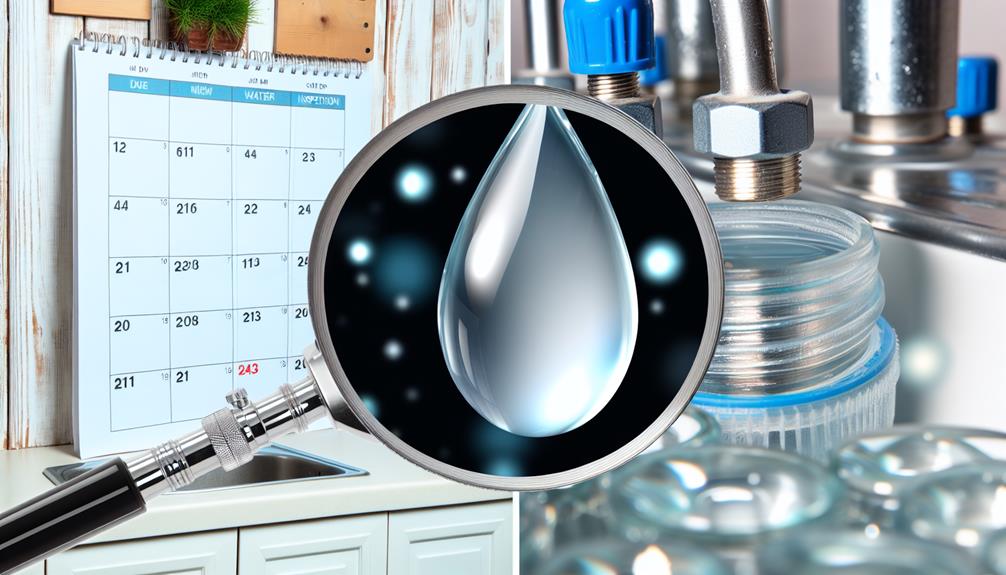
Having chosen a high-quality water filter, it's crucial to keep track of your household's water consumption to maintain the system's efficiency and longevity. Regularly monitoring your water usage patterns isn't just about conserving water; it also helps you to detect any anomalies that could indicate a problem with your water filtration system.
To effectively manage this, start by establishing a baseline of your average water use. Check your water bills or install a usage meter if necessary. Once you have a clear understanding of what your normal consumption looks like, you can recognize significant deviations. Sudden increases in water use can signal leaks or malfunctions within the filter system, necessitating prompt action.
Pay attention to water quality changes, too. Variations in taste, odor, or sediment in the water can point to filter saturation and the need for maintenance or replacement. Remember, a well-maintained filter is less likely to fail and cause unexpected increases in water consumption.
Seek Professional Discounts
As you consider the maintenance of your water filtration system, don't overlook potential discounts that professionals may offer.
Engaging in a loyalty program can yield benefits such as reduced rates on checkups or priority scheduling.
Additionally, inquiring about seasonal service offers or bulk inspection savings could significantly lower your long-term maintenance costs.
Loyalty Program Benefits
Enrolling in a loyalty program can unlock exclusive discounts on water filter checkups, ensuring you receive professional services at a reduced cost. Membership exclusivity often comes with reward tiers that provide incremental benefits as your loyalty increases. You'll find that the longer you're a member, the more substantial your savings could be.
Look closely at the terms and conditions of these programs to understand the specifics of the tiered rewards. Higher tiers might offer you priority scheduling for maintenance or even complimentary services after a certain number of checkups.
It's practical to consider how often you'll need services and align that with the potential long-term benefits of a loyalty program. Make sure to leverage these programs for cost-effective maintenance of your water filtration system.
Seasonal Service Offers
To capitalize on additional savings, consider scheduling your water filter checkups during seasonal service offers when professionals may provide discounts to encourage routine maintenance. Employing discount strategies during these times can lead to substantial cost reductions. Off peak scheduling not only aids in managing your expenses but also ensures that your system is serviced when it may be under less strain and before potential peak season issues arise.
Here's how to make the most of these offers:
- Monitor for Deals: Regularly check service providers for advertised seasonal promotions.
- Plan Ahead: Schedule your maintenance during known discount periods.
- Ask for Off-Peak Discounts: Inquire about reduced rates during slower business periods.
- Combine Services: Bundle checkups with other maintenance tasks to maximize savings.
Bulk Inspection Savings
Consider seeking bulk inspection savings by requesting discounts for multiple water filter system checkups scheduled at the same time, a practical approach that can significantly lower your maintenance costs.
When you're managing several units, this strategy not only streamlines the maintenance process but also extends the filter lifespan through consistent professional oversight.
Delve into inspection partnerships with service providers; they often reward loyalty and bulk service agreements with reduced rates. Be explicit about your expectations and the frequency of checkups to ensure you're both on the same page.
This isn't just about immediate savings—it's an investment in the longevity and reliability of your water filtration systems. Remember, a well-maintained filter is synonymous with cost efficiency and superior performance.
Understand Warranty Terms
You need to be clear about what your water filter's warranty covers and what it doesn't. Familiarize yourself with the process for filing a claim to ensure you can do so efficiently if needed.
Warranty Coverage Details
Understanding the specifics of your water filter's warranty coverage is crucial to ensuring that any future issues will be addressed promptly and without unexpected costs. Dive into the fine print and familiarize yourself with the particulars, as overlooking details may leave you with an invalid claim when you need support the most. Here's what to watch for:
- Filter Exclusions:
Know which parts or problems aren't covered under warranty to avoid surprise rejections.
- Coverage Extensions:
Investigate options for prolonging your warranty, ensuring long-term protection.
- Claim Procedures:
Understand the exact steps for filing a warranty claim to expedite the process.
- Timelines:
Be aware of the warranty period and any critical deadlines for reporting issues.
Stay proactive about these points to maintain your peace of mind and wallet.
Claim Process Simplification
To streamline your warranty claim process, it's essential to grasp the terms and conditions laid out in your water filter's warranty documentation. Understanding these specifics ensures that you'll navigate the claim automation system with ease, promoting documentation efficiency.
| Coverage Period | Claim Submission Guidelines |
|---|---|
| Check the exact duration your filter is covered under warranty. | Familiarize yourself with the steps for lodging a claim, such as online forms or direct customer service contact. |
| Determine if extended coverage is available. | Ensure you have all necessary purchase and maintenance records organized for submission. |
Maintenance Vs. Warranty Limits
Regular maintenance can have a significant impact on the terms of your water filter's warranty. It is important to understand the boundaries of warranty coverage and how proper maintenance can extend the lifespan of your filter. Neglecting maintenance can result in unexpected damage that may not be covered by the warranty. Here are some key points to keep in mind:
- Adhere to Maintenance Schedules: It is crucial to follow the recommended maintenance schedules for your water filter. Skipping routine checkups or neglecting maintenance tasks can void your warranty.
- Use Authorized Services: If your water filter requires repairs or servicing, it is essential to employ authorized services. Using unofficial or unauthorized repair services can invalidate your warranty. It is always best to consult the manufacturer or authorized dealers for repairs.
- Document Everything: Maintain a meticulous record of all maintenance work carried out on your water filter. This documentation will serve as evidence of compliance with the warranty terms. Keep records of service dates, repairs, replacement parts, and any other relevant information.
- Understand Exclusions: It is crucial to be aware of the exclusions specified in your warranty. Typically, warranties do not cover damage caused by external sources, such as natural disasters or accidents. Additionally, misuse or improper handling of the water filter may also not be covered. Familiarize yourself with the specific terms and conditions of your warranty to have a clear understanding of what is covered and what is not.
Conclusion
In conclusion, there are several strategies to ensure your water filter system remains efficient.
First, it is important to stick to a maintenance schedule. Regularly cleaning and replacing filters will help maintain the system's effectiveness.
Additionally, consider optimizing the timing of filter replacements. Some filters may need to be changed more frequently than others, so be sure to follow the manufacturer's recommendations.
When selecting filters, opt for high-quality options. While they may have a higher upfront cost, they can provide long-term savings by lasting longer and removing contaminants more effectively.
Another important aspect to monitor is your water usage. Keep an eye out for any unusual increases, as this could be a sign that the filter system is not working properly.
Take advantage of professional discount programs if available. These programs can help you save money on filter replacements and other maintenance services.
Lastly, always stay informed about the specifics of your warranty. Knowing what is covered and for how long can help you better manage costs and ensure that any necessary repairs or replacements are taken care of.
By adopting these practical strategies, you can maintain clean water and manage costs effectively.
